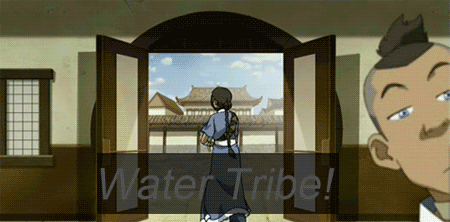They say that one day, Raven became enraged with the senseless killing that man engaged in. But the people refused to learn and change, so Raven took the sun away. The world was covered in a long night. The other peoples inland began to panic and pray to Raven. Their tribe took part in this as well, until it became obvious that Raven would not hear. And so their leaders took upon their shoulders the decision to turn to the sea.
Under the water it was always dark - those creatures would be best adapted to teaching them how to live in a world without the sun. They turned to the moon and the tides to show them their way, learned the crafts of fishing and hunting through the dark woods upon the coast. They built strong canoes and sleds for running out upon the solid ice. They took the harsh winter that came from the long night and learned from it, coming out stronger than the inland peoples that ran in fear.
When the sun came back, their tribe kept to the lessons learned during the long night. So when the days grew shorter and the sun eventually took many moons to return, they were prepared and did not lack. They turned from Raven and the sun and gave themselves over fully to the Moon and the Sea - the true constants in life.
Many years later, men from a land of fire came to see them. They carried tales of a sun that always shined and a land that saw no snow. As is often the case with fire and ice, it wasn’t long until the two peoples clashed in an eruption of steam and war. It was bitter, long, and hard, no less than their elements demanded.
Years had passed, and the war seemed to finally be slowing down when the chief found a boy among the wreckage of one of the last Fire Ships to leave their lands. Though he was a child of sun, the chief’s heart went out to the injured child. So he picked the boy up, and took him home to his own tent. The others in the village protested, wanting him to abandon the child because he was of the peoples of fire. The chief tried to get them to see how well the child had taken to their ways, and how badly the boy wished to be a part of their water tribe.
Finally, the long winter came. As the days grew shorter, the boy grew colder, quieter. Their shamans said his fire was dying without the sun. The chief called a meeting, and the tribe hashed out the boy’s fate until a conclusion had been reached: if the boy lived past the long winter, he was meant to be there and would become water. It was all in the spirit’s hands now.
Notes: So I was really intrigued by the story about Raven-Boy and the Sun. It was such a neat idea, that Raven took the sun away and his brother/son had to steal it back. The story reminded me of a little story I’d read some years before (couldn’t remember the name, or find it) so I basically wove the two into one. I made the people adapt during the period of no sun, and added bits of the adopted child. It made for a neat little thing, I think.
Bib: “The Raven Myth: Raven-Boy and the Sun” from Myths and Legends of Alaska by Katharine Berry Judson (1911). Web Source.

Elizabeth,
ReplyDeleteYour story is great! It remind me so much of the show Avatar the Last Airbender. Your picture is awesome, with Sokka saying "Water Tribe!" I think it is perfect and I loved the story. I didn't read the story about the Raven boy, but I'm curious to learn about what happen to the boy. You must tell me!
Hi Elizabeth! I really like how your story was an explanation for the six months of darkness that Alaska experiences in the winter months. I also really appreciated how you tied your story in with the show Avatar: the Last Airbender, and that gif was perfect! I was thinking about how much your story reminded me of the different 'bending' tribes so your gif really made me laugh. Great job this week!
ReplyDelete